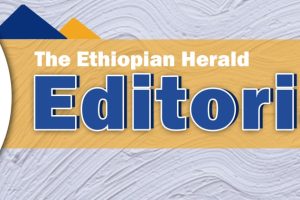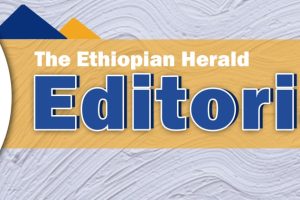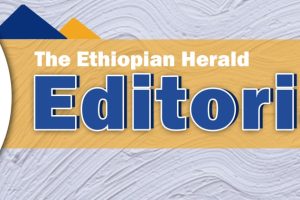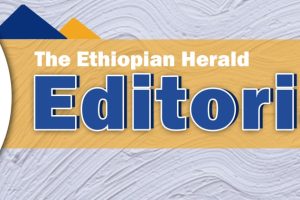
As Ethiopians’ victory at Adwa has inspired all black people, their current activities of constructing the biggest dam in Africa, the Grand Ethiopian Renaissance Dam (GERD) has become an icon of inspiration. The pioneering mega hydropower generation dam project of app. USD 5 billon has become the focus of African nations. This was demonstrated by inflow of delegations to visit the project.
Recently, delegations from three African nations have come to take lessons on how Ethiopia could proceed with the project while it is poor in terms of financial capacity to run such a big project. Inga-3, a USD 14 billion mega hydro dam project, which is expected to generate over 11,000MW was launched in 2013. Democratic Republic of Congo thought this project would supply power to South Africa, Nigeria and its mining areas in the east.
Though World Bank had promised to finance the project it did not materialize. So, the Congolese government started looking for other alternatives. Cognizant to the fact Ethiopia is handling a similar project by its own, the Congolese as well as Zimbabwe and Zambia who are building a mega dam on Zambezi river, came to Ethiopia.
Their major goal was to learn the “miracle” behind Ethiopia’s self-financing of its grand Ethiopian renaissance dam (GERD). The delegations of the three countries consulted with the Ethiopian ministry of water, irrigation and electricity on the issue and visited the GERD project. After the visit, Muzungu Diakolo, DRC’s diplomat to Pretoria and representative of the grand Inga-3 Project said, “What I learnt from this Africa’s massive engagement of the public is a reliable source of finance and it creates a sense of ownership.
This is a model for other massive national projects in the continent.” He was also astounded by the manner the dam is under construction only by the contribution of the people and without any foreign borrowing. “It is really very pleasing to see Africa commencing such huge projects by its own capital. This is great. We also want to implement the same in our country we want to learn how to mobilize the public at this level,” Muzungu mentioned. Ethiopia’s flagship project, which has already become Africa’s pride has also ignited extra surprise to another Congolese visitor, Eng. Tobi Shalondawa.
“We will soon start building the Inga-3 project our visit is to take lessons regarding how the Ethiopian government is constructing this grand Ethiopian renaissance dam,” he said. Eng. Benson Piyaratti from Zimbabwe energy ministry indicated that his nation is building Batoka Hydropower Project on Zambezi River and his team was at GERD project site to take the success lessons and he said the visit was quiet thriving. “Many think Africa is unable to undertake mega projects like the Grand Ethiopian Renaissance Dam. Nevertheless, it is an African nation that is building this massive project.
I’m really happy for this. This is a project that offers a great inspiring lesson to other African nations; it also demonstrated Africans that we can carry out the same by our own. We have now got enough lessons how Ethiopians have been mobilized to financially support the dam,” Eng. Benson told reporters at the construction site of 5-billion-dollar project. Fekahmed Negash, Director General of Eastern Nile Technical Regional Office (ENTRO) shares the view.
He states that in very poor nations, giant infrastructure projects like GERD have never been seen while being built by the nations own finance. Most of the mega projects in Africa and other developing nations have been built by colonial powers or by the support of developed nations or financing institutions. “As we start GERD, African nations have shown support.
This support emanated from the thinking that the project is direction indicator to them as well. They took it as pioneering and symbolic. The fact that the dam is self-financed has become a huge lesson for nations who could not win financial support because of the complicated financial principles and programs by the global financial institutions,” he said.
According to the director general, since rivers like the Nile, which are vulnerable to substantial hydro-political disputes, and because some nations exert pressures on others’ development tasks, the emergence of GERD under these scenarios offers immense lesson to others.
He pointed out that citizens in some nations have demanded their governments why they don’t learn from Ethiopia and build the same big projects. “Leaders, representatives and diplomats of many nations have so far visited GERD. It is Africa’s icon,” he underlined. Though Ethiopia’s mega hydropower project has demonstrable lessons to the countries in the region, as mentioned earlier, it has also been marred by delays. The Ethiopian government has currently entered into compensation tasks for swift accomplishment of the dam.
In fact, this should not be a surprise since several of the world’s most advanced architectural project faced significant delay and far more extra cost than originally scheduled. According to some global studies mega infrastructure projects can incur an average of 40 – 60 % extra costs of time and finance. This is common phenomenon on both in developing and developed nations, Fekahmed says. The newly appointed GERD project general manager Eng. Kifle Horo tops up the director’s remark. “All projects globally can delay.
This is a universal feature of projects. Sydney Opera House in Australia is one of the great iconic buildings of the 20th century, a global image of great beauty. This project lasted in 14 years though it was thought to be finished in 4 years.It also took over 102 Australian shillings but planned to be erected only at 10 million shillings,” Eng. Kifle illustrated. The Channel Tunnel that connects England and France is considered as one of the topmost engineering success in the world.
This project as well was completed after significant delay and causing 80% additional costs. Wembley Stadium in England and other projects around the globe came into existence after encountering such problems and beyond, he added. However, Eng. Kifle accepts that the information about the progress of the dam reached the public too late. This gave some entities the chance to propagate GERD’s delay exaggeratedly and spread hopelessness over the dam among the public. “Projects can delay. Even in NASA, where there are the world’s high ranking scientists, this happens.
So, identifying the root causes of the delay and looking for solutions would be essential rather than hiding the truth from the public,” he affirmed, hinting that the future of reporting about project progress will not be hidden from the public. It is apparent that whatsoever remedial intervention the government has decided to take so as to give the fastest possible completion of the project, it should address the moral questions of the public. Fekahmed has a concern here. “The delay might touch the moral of the public. And this might become an obstacle for gaining public support of the same scale for Ethiopia’s future mega projects.
So, we should ponder how we can attain the same level of public support and finalize GERD.” Fekahmed’s suggestion is in fact ideal. Ethiopians locally and abroad have unanimously demonstrated practical support with indomitable spirit to their grand dam regardless of ethnic, religious and political differences. Thus, this wave of public support must be grained.
Even it is this wave which African countries want to cause among their people as Muzungu and Benson witnessed after visiting Ethiopia’s grand dam. But failure to strengthen the momentum of public support would cause further delay which would in turn cause the nation to incur 800 million USD each year. This would also be against the goals of the project.
No Ethiopian tolerates poverty, nor will the government allow further delay of the dam. That is why the deadline for the project has been rescheduled for 2022, according to Eng. Kifle. Another big hope for Ethiopians and those Africans who are eagerly waiting for the power from the dam is that the initial generation will start in 2020.
The Ethiopian Herald January 30/ 2019
BY YONAS





